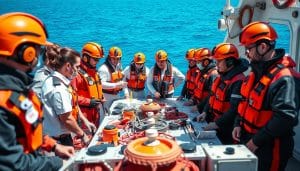Maritime Risk Assessments: Best Practices for a Secure and Compliant Operation
In the maritime industry, where the stakes are incredibly high, understanding and managing risks is essential for ensuring the safety and compliance of operations. Conducting thorough maritime risk assessments is a critical practice that helps identify potential hazards, assess their impacts, and develop strategies to mitigate them. This article will explore the best practices for conducting maritime risk assessments, ensuring not only regulatory compliance but also enhancing security and operational efficiency in your maritime endeavors.
Key Takeaways
- Identifying the types and sources of maritime risks is essential for comprehensive risk assessment.
- An effective maritime risk assessment incorporates key components such as hazard identification, risk analysis, and mitigation strategies.
- Implementing best practices in risk assessment protocols can significantly enhance operational safety and efficiency.
- Ensuring compliance with regulatory requirements is critical for maintaining security in maritime operations.
- Continuous monitoring and review of risk assessments are necessary to adapt to evolving maritime threats.
Understanding Maritime Risks: Types and Sources
Understanding maritime risks is crucial for ensuring the safety and compliance of operations within the maritime industry. Maritime risk assessments: best practices for a secure and compliant operation involve identifying, analyzing, and mitigating potential hazards that can impact vessels, cargo, and crew. These risks can be categorized into various types, including environmental, operational, and regulatory risks. Environmental risks pertain to natural factors such as weather conditions and climate changes, while operational risks may arise from human errors, mechanical failures, or inadequate training of personnel. Regulatory risks are associated with compliance to international maritime laws and local regulations that govern safety and environmental protection. To effectively manage these risks, maritime organizations should implement best practices such as conducting regular risk assessments, investing in crew training, and utilizing advanced technology for monitoring and reporting. By embedding these practices into their operational framework, companies can not only safeguard their assets but also enhance their reputation and reliability in the highly competitive maritime sector.
Key Components of an Effective Maritime Risk Assessment
Conducting Maritime Risk Assessments: Best Practices for a Secure and Compliant Operation is essential for ensuring safety and regulatory compliance in the maritime industry. One of the key components of an effective maritime risk assessment is the identification of potential hazards. This involves determining risks associated with vessel operation, cargo handling, crew safety, and environmental factors. Next, a thorough evaluation of both the likelihood and impact of identified risks must be performed. Utilizing tools such as risk matrices facilitates a clear understanding of risk prioritization. Additionally, implementing control measures to mitigate these risks, followed by regular reviews and updates of the assessment, is critical. It ensures that new risks are identified and managed appropriately. By incorporating these essential elements into the risk assessment process, maritime operations can be more secure and compliant with industry regulations.
Best Practices for Implementing Risk Assessment Protocols
Implementing effective maritime risk assessments is crucial for ensuring safe and compliant operations within the shipping and maritime industries. To achieve this, it is essential to adhere to best practices that enhance both operational efficiency and safety standards. Begin by conducting a thorough identification and analysis of potential hazards, which can range from environmental factors to equipment failures. Involving a diverse team of experts in your assessments not only enriches the evaluation process but also fosters a culture of safety onboard. Regular training sessions for all personnel on risk management procedures should be prioritized, ensuring everyone understands their role in mitigating risks. Additionally, establishing a continuous monitoring system will allow for the timely updating of protocols based on new threats and operational changes. By focusing on these best practices when conducting maritime risk assessments, organizations can minimize liabilities, protect their assets, and maintain compliance with international maritime regulations, ultimately leading to a more secure and efficient operation.
Ensuring Compliance and Enhancing Security in Maritime Operations
In today’s complex maritime environment, organizations must prioritize maritime risk assessments to ensure compliance with international regulations and safeguard their operations. Conducting thorough maritime risk assessments enables companies to identify potential vulnerabilities and implement effective risk mitigation strategies. Best practices for a secure and compliant operation involve regular audits to evaluate compliance with safety standards, ongoing training for personnel on risk management protocols, and leveraging technology to enhance situational awareness. By integrating these best practices into their maritime operations, businesses can effectively minimize risks and safeguard not only their vessels but also their crew and cargo, ultimately leading to a more robust and resilient maritime operation.









